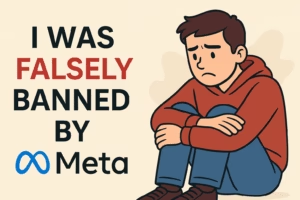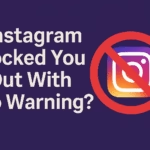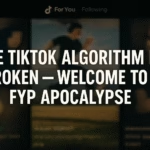How AI moderation destroyed my online life, ruined my offline relationships, and left me with zero recourse

It doesn’t matter if you’re innocent.
Not on Meta. Not with AI moderation.
This is what people don’t understand about these bans:
They’re not just account removals.
They’re social death sentences.
You get labeled with one of the worst crimes imaginable — without proof, without due process, without a single human being reviewing your case. Then, you’re expected to “appeal” to the same machine that executed you.
And if you’re brave enough to tell your friends what happened? You get banned by Meta.
And you lose your name.
The Short Version
-
Meta bans for “CSAM” are destroying reputations — even when they’re false.
-
Appeals don’t work. Accounts disappear. Lives unravel.
-
Users are reporting a ripple effect: friends get banned just for posting your face.
-
This isn’t just an algorithmic mistake. It’s digital defamation with real-world fallout.
-
Tools like Social Proxy can help you stay safer on Meta by separating devices and sessions.
This Is What Social Exile Looks Like
The original poster (OP) wasn’t banned for violating community guidelines in any normal sense. According to them, Meta slapped them with a CSAM-related ban — an accusation so serious, it doesn’t even matter if it’s false.
Once that label is on you, it doesn’t just silence your account.
It erases your social credibility.
Their friends didn’t just avoid talking about the ban. They started avoiding them entirely. No more tagging in photos. No more shoutouts. Even posting a supportive story saying “Free him” resulted in a second ban.
Coincidence? Maybe.
But when Meta’s appeal system now demands face scans… suddenly it doesn’t feel so random.
When Friends Fear the Algorithm
Let’s be real: your friends might not ghost you because they believe the accusation. They ghost you because they’re scared.
Scared of being flagged.
Scared of being banned by association.
Scared of being next.
We’re entering an era where social behavior is being shaped not by what’s true… but by what AI thinks might be true.
That’s a problem. Because AI doesn’t do nuance.
You can get flagged for a joke.
A glitch.
Or being misidentified.
And once it happens? People start treating you like a virus — avoiding any public trace of you, just in case the algorithm sees and follows.
The Reputation Cost of “Too Honest”
The OP admitted something critical:
They made a mistake by being honest about the reason for their ban.
Instead of using a cover story — like “I got hacked” or “I deactivated to take a break” — they told their friends the truth.
It backfired.
It sparked gossip. People debated whether the accusations were true. Some assumed guilt. Others distanced themselves — not because of doubt, but because Meta’s systems don’t allow room for doubt.
Meta says nothing publicly.
But its silence acts as confirmation.
And it puts the burden on you to explain a charge you never even got a chance to defend.
That’s how rumors win.
That’s how AI-accused people lose.
Meta Is Untouchable. But That Doesn’t Make It Right.

Let’s get one thing out of the way: you probably can’t sue Meta for defamation.
One of the most upvoted replies in that thread came from an Ontario lawyer who laid it out clean: Meta didn’t publish the accusation to anyone else. They just told you. That’s not “defamation” in the legal sense — even if the accusation wrecks your life.
So even though you got slapped with the ugliest label on the internet — and even though it wasn’t true — you have no case unless you can prove Meta told someone else about it.
The machine flags you. You get exiled. But since no human made the accusation, no human can be held accountable. Not even the company.
And that’s the real problem.
Meta has built a system that can level the most damaging accusations in existence — without having to stand behind them.
No one has to sign off on it. No employee reviews the context. You’re flagged, locked out, and presumed guilty by your social circle. You get facial scans, broken appeals, and silence. Meanwhile, Meta keeps its hands clean.
And your only option is to lie about it or disappear.
That’s not safety. That’s algorithmic authoritarianism.
The Appeal Process Is a Joke — and the AI Knows It
Let’s talk about how appeals really go.
You follow the instructions. Upload your face. Reconfirm your identity. Beg the void.
Then you wait. Days, weeks, maybe forever. You never get an answer — just that quiet, humiliating screen that says, “Your account has been disabled for violating our Community Guidelines.”
No specifics. No evidence. No way to ask a human being, “Hey, what did I actually do?”
And when you do get back in — if you’re lucky — you’ll find your account stripped. Email removed. Phone number wiped. Two-factor disabled. Like someone else got in and scrubbed your presence clean.
You were the target. Now you’re the stranger.
So yeah — people are scared to post with you. Scared to mention you. Scared to even DM you. Not because they believe the AI… but because they know the AI doesn’t need a reason.
Social Survival Is Now Strategic Dishonesty
You know what the smartest people in the thread did?
They lied.
They told friends they got hacked. They said they deactivated. They invented reasons, excuses, anything to avoid the real topic.
Because saying “Meta falsely flagged me for CSAM” doesn’t open a dialogue. It sets off alarms.
Even if your friends know you didn’t do anything, the second you say it out loud, you become radioactive. Not because of what you did — but because of what Meta’s systems might interpret next.
People assume Meta knows something. That the AI must’ve seen something. That surely you wouldn’t be banned for nothing.
So the truth becomes the trap. And a white lie becomes your only way out.
That’s the new rule of survival: Don’t explain the ban. Explain it away.
It sucks. But it’s real. And it’s working for the people who still have their friends.
What You Should Say (If You Ever Get Hit)
If this hasn’t happened to you yet, here’s a playbook worth saving:
-
Say your account got “unauthorized access” and you’re waiting for a fix.
-
Tell people you’re taking a break from Meta platforms.
-
Say you deleted your account because of privacy concerns.
-
Do not mention the word “ban” — ever.
-
If someone asks if you were flagged for CSAM or other serious violations, just say, “I honestly have no idea what happened — it’s under review.”
Why all the cover stories?
Because no one wins the social battle by trying to clear their name. You’re not on trial — you’re already sentenced. Meta just lets the silence do the talking. You don’t get to defend yourself, and if you try, it only makes things worse.
Let people fill in the gaps. Just make sure you’re the one giving them the pen.
Your Tools Are Limited. But Not Zero.
You can’t control Meta’s AI. You can’t force them to reverse a ban. But there are a few ways to lower your risk of being flagged — or at least, flagged again:
-
Use Social Proxy to separate your real device from your Meta presence. This helps you avoid device fingerprinting issues that could connect your new account to a banned one. Affiliate link — but it’s a legit solution.
-
Avoid logging into the same account on multiple phones or shared devices.
-
Don’t tag or be tagged in photos by friends who are paranoid — they might block you out of self-preservation, and that just fuels the exile.
-
Watch your appeal language. Don’t confess. Don’t speculate. Keep it neutral and procedural. You’re not convincing a person — you’re avoiding a trigger.
-
When you get back in (if ever), rebuild quietly. No “I’m back” posts. No mentions of what happened. Just resume as if nothing occurred.
Because the second you remind the machine you exist — you’re at risk again.
To Everyone Who’s Been Falsely Banned: You’re Not Alone
Meta made you invisible.
But you’re not crazy. And you’re not alone.
There are thousands of us.
Banned without reason. Flagged by machines. Silenced without recourse. And quietly erased from our digital lives.
What’s worse is not the ban.
It’s the stigma.
The gossip.
The slow unraveling of your social credibility by people too scared to stand next to you — even if they believe you.
This is not your fault.
This is a system that punishes the honest and rewards silence. A system that treats facial scans as evidence, but never shares its own.
So if you’re still stuck, still fighting, still hoping for a fix — don’t give up. But don’t wait around for justice, either.
Start thinking beyond Meta.
Because real creators don’t beg to exist on platforms that treat them like criminals without proof.
They adapt.
They build elsewhere.
They protect themselves — and each other.
And If You’re Still on Meta… Here’s Your Warning
You are one AI glitch away from losing everything.
One misinterpretation. One automated flag. One appeal routed into the void.
You won’t get a call. You won’t get a trial.
You’ll get silence.
Then exile.
And when it happens, people won’t ask what went wrong.
They’ll ask what you did.
So have your story ready.
Or better yet — start backing yourself up now.
Diversify your presence.
Control your domain.
And stop treating social media platforms like permanent homes.
They are rented spaces.
And the landlord is an unfeeling machine.


